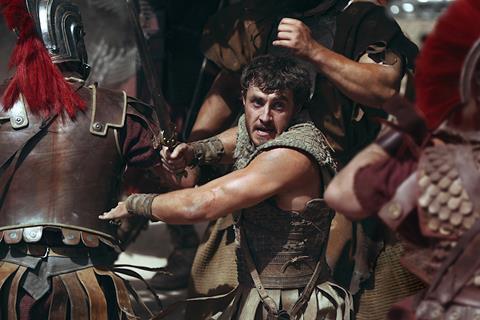Paul Mescal, Pedro Pascal and Denzel Washington cross swords in Ridley Scott’s stirring return to ancient Rome

Dir: Ridley Scott. US. 2024. 148mins
Paul Mescal has big sandals to fill in Gladiator II, a brawny spectacle that cannot quite match the stirring spirit of the original film almost 25 years later. Essentially playing the Russell Crowe role in this long-awaited sequel, the rising star brings a rugged masculinity to his performance as an enslaved man forced to battle to the death in the Roman Colosseum. Returning to this ancient, bloodthirsty world, director Ridley Scott has lost none of his flair for grandeur, but ultimately Gladiator II is diminished by a nagging recognition that this material felt fresher in the first film — and that Denzel Washington’s devilish schemer steals the picture from Mescal.
This material felt fresher in the first film
Opening on November 15 in the UK and a week later in the US, this Paramount release looks to be both an awards contender and a commercial champion. Gladiator won the top prize at both the Oscars and the Baftas, collecting a hefty $466 million worldwide. Back then, Crowe was an acclaimed young actor transitioning to big-budget fare — almost exactly the same position in which Mescal, who was a 2020 Screen Star of Tomorrow, now finds himself. The Wicked musical will be dominating screens around the same time, but the betting is that Gladiator II should make a killing as well.
Almost two decades after the events of Gladiator, a young barbarian named Lucius (Mescal) lives with his wife and child in Numidia, which is invaded by the powerful Roman army led by the fearless Marcus Acacius (Pedro Pascal). Lucius fights bravely, but his people are conquered and his family is slaughtered. Soon, he is taken prisoner and shipped to Rome, where he is purchased by the ambitious businessman Macrinus (Washington) who grasps the potential of this warrior in the Colosseum. But all Lucius wants is revenge against Marcus.
In its broad strokes, Gladiator II sounds reminiscent of the first film’s plot, which tracked Crowe’s Maximus as he becomes a lowly gladiator after the murder of his family, vowing to destroy the corrupt Roman Empire. This, essentially, is the premise of Gladiator II as well, and screenwriter David Scarpa even introduces twin emperors, Geta (Joseph Quinn) and Caracalla (Fred Hechinger), who are just as snivelling as Joaquin Phoenix’s impudent Commodus from the 2000 film.
But that feeling of deja vu comes with a twist — actually, several — as Scott focuses on supporting characters who are not who they initially appear to be. Prominent among these is Marcus, a noble soldier who has grown tired of the empire’s endless craving for more territory. Lucius believes this man to be his enemy, not realising that Marcus is secretly plotting a coup to end the tyranny of Geta and Caracalla. When Lucius, who quickly demonstrates his lethal fighting skills in the Colosseum, eventually squares off with Marcus, he is unaware that they are more aligned than he could possibly know.
Political manoeuvring and hidden agendas litter Gladiator II as Lucius begins to become aware of his destiny. Separated in childhood from his mother Lucilla (Connie Nielsen, reprising her role from the first film), he never knew his father — or that the man was the mighty Maximus, who died in Gladiator trying to create a more democratic Rome. Unfortunately, though, Mescal fails to be as striking an action star as his predecessor. In part, that choice is intentional, with the actor conveying the same sensitive introspection he brought to Aftersun and All Of Us Strangers. Unlike the decorated general Maximus, Lucius has only known the life of a commoner, and Mescal plays him as reserved and cynical, the character’s rippling muscles belying his soft-spoken manner. Nonetheless, it is noticeable — and a disappointment — that Mescal’s thinly-drawn character proves less compelling than the world around him.
Production designer Arthur Max and cinematographer John Mathieson, both returning from the original film, give Rome a lurid opulence, hinting at a spiritually sick empire on the verge of collapse. This is especially apparent during this sequel’s Colosseum action sequences — a highlight of Gladiator — which are far more grandiose but also much sillier, including one sequence involving the arena floor being flooded and filled with sharks.
The supporting turns are generally solid, although the complicated plot machinations often force the characters to be mere chess pieces pushed around the board. But Washington makes a meal of his conniving villain, who has plans for Lucius he only slowly reveals. Rarely has the star been as swaggering as he is as Macrinus, whose narrative arc ends up being more fascinating than that of the film’s protagonist. Where Mescal’s performance is grounded but a bit dry, Washington radiates a showman’s delight, relishing his character’s deviousness. Inside or outside of the Colosseum, Gladiator II has no greater attraction.
Production companies: Scott Free, Lucy Fisher/Douglas Wick
Worldwide distribution: Paramount Pictures
Producers: Douglas Wick, Ridley Scott, Lucy Fisher, Michael Pruss, David Franzoni
Screenplay: David Scarpa, story by Peter Craig and David Scarpa, based on characters created by David Franzoni
Cinematography: John Mathieson
Production design: Arthur Max
Editing: Claire Simpson, Sam Restivo
Music: Harry Gregson-Williams
Main cast: Paul Mescal, Pedro Pascal, Joseph Quinn, Fred Hechinger, Lior Raz, Derek Jacobi, Connie Nielsen, Denzel Washington
























